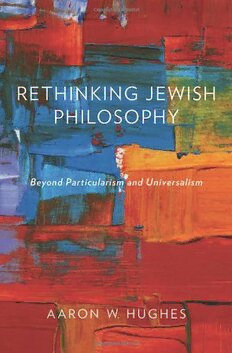
Rethinking Jewish Philosophy: Beyond Particularism and Universalism PDF
Preview Rethinking Jewish Philosophy: Beyond Particularism and Universalism
Rethinking Jewish Philosophy Rethinking Jewish Philosophy Beyond Particularism and Universalism z AARON W. HUGHES 1 1 Oxford University Press is a department of the University of Oxford. It furthers the University’s objective of excellence in research, scholarship, and education by publishing worldwide. Oxford New York Auckland Cape Town Dar es Salaam Hong Kong Karachi Kuala Lumpur Madrid Melbourne Mexico City Nairobi New Delhi Shanghai Taipei Toronto With offices in Argentina Austria Brazil Chile Czech Republic France Greece Guatemala Hungary Italy Japan Poland Portugal Singapore South Korea Switzerland Thailand Turkey Ukraine Vietnam Oxford is a registered trade mark of Oxford University Press in the UK and certain other countries. Published in the United States of America by Oxford University Press 198 Madison Avenue, New York, NY 10016 © Oxford University Press 2014 All rights reserved. No part of this publication may be reproduced, stored in a retrieval system, or transmitted, in any form or by any means, without the prior permission in writing of Oxford University Press, or as expressly permitted by law, by license, or under terms agreed with the appropriate reproduction rights organization. Inquiries concerning reproduction outside the scope of the above should be sent to the Rights Department, Oxford University Press, at the address above. You must not circulate this work in any other form and you must impose this same condition on any acquirer. Library of Congress Cataloging-in-Publication Data Hughes, Aaron W., 1968– author. Rethinking Jewish philosophy : beyond particularism and universalism / Aaron W. Hughes. p. cm. Includes bibliographical references and index. ISBN 978–0–19–935681–2 (cloth : alk. paper) 1. Jewish philosophy. 2. Judaism and philosophy. 3. Derrida, Jacques—Criticism and interpretation. I. Title. B154.H84 2014 181’.06—dc23 2013028087 9780199356812 1 3 5 7 9 8 6 4 2 Printed in the United States of America on acid-free paper für e.r.w. Contents Preface ix Acknowledgments xvii Introduction: Occupation 1 1. Impossibilities 14 2. Irreconcilability 28 3. Kaddish 49 4. Authoritarianism 66 5. Rosenzweig’s Patient 85 6. Beyond 108 Notes 127 Bibliography 153 Index 167 Preface Every preface is in reverse [Toute preface est à l’envers]. It presents itself the right way round, as is required, but in its construction, it proceeds in reverse; it is developed (“pro- cessed”), as one says of photography and its negatives, from its end or supposed purpose: a certain conception of its architectural “project.”1 like many others in my field, I have spent most of my life reading Jewish philosophers as shining exemplars of the universalizing tenden- cies within Judaism. Juxtaposed against the forces of obscurantism, so the master narrative of Jewish philosophy goes, these individuals articu- lated a Judaism that was as rational and inclusive as it was open to the cosmopolitan trends of the civilizations in which Jews historically found themselves. This narrative has performed a great deal of intellectual work as Jewish thinkers in the modern period have used it—and indeed con- tinue to use it—in order to show that Judaism, as a religion not unlike others, can be integrated within and respond to the demands of the modern nation-state.2 Jewish philosophy, in other words, has been used to normalize Ju- daism, to demonstrate the tradition at its most rational. Jewish philoso- phy—in its many guises and forms—has been perceived to have taken the particular elements of Judaism and subsequently translated and con- structed them into universal terms in ways that show potential filiations between a Judaism deemed authentic and an external standard imag- ined as universally binding. Yet the potential counterpoints between the particular and the universal risk masking the instability of both. Each requires the other for its determinacy, just as each is simultaneously un- dermined by the indeterminacy of its opposite. This alterity, the subject
